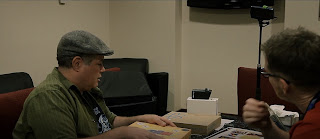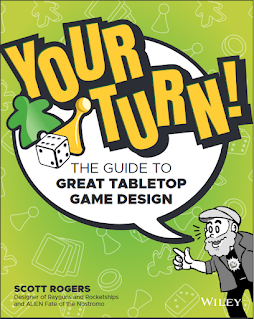The documentary film Gamemaster (that I happen to be in) features scenes of game designers pitching games to publishers. Many say that pitching their game is their least favorite part of being a game designer; but to be honest, I really enjoy doing it! If you don't like to pitch games, allow me to share a few pointers with you.
But before I start, you might be asking "How do I even start pitching a game?" The first step is to find the publishers that you want to pitch to. I suggest that you research each company and the types of game the company makes. If they publish only hardcore Eurogames, then you might not want to pitch your space combat game to them. Create a list of potential publishers and then reach out to them via email. (You often can find a contact link via their website) Send them a brief but polite message along the lines of:
Dear Publisher,
I am a game designer with an exciting new game design called (game name here). I will be attending (name of convention) and if you have a few minutes, I would love to show (game name here) to you. Please contact me so we can coordinate our schedules. I look forward to hearing from you soon.
I am a game designer with an exciting new game design called (game name here). I will be attending (name of convention) and if you have a few minutes, I would love to show (game name here) to you. Please contact me so we can coordinate our schedules. I look forward to hearing from you soon.
Sincerely,
your name here
your name here
I would include a sell-sheet with this email which I talk about here - http://mrbossdesign.blogspot.com/2019/04/the-importance-of-sell-sheets.html - and your contact information.
Once a publisher accepts and schedules a pitch meeting (you usually only have 30 minutes to pitch, keep your pitch lean and tight!) (Also, give yourself time to get from one meeting to another - 15-30 minutes depending on the size of the show!) now you are ready to use these six pointers during your pitch meeting..
- Tell a story, not instructions: People loves stories. It's how we communicate with each other on a daily basis. However, when it comes to teaching someone how to play a game all too often the designer will rattle off a list of instructions instead - which can be boring and tedious. Even worse, your audience is trying to hold all of this information in their head about how to play the game - which can be hard, especially at a noisy and distracting place like a board game convention.
Instead, tell "the story of your game." Who the player is, Why they are doing what they are doing, How they are going to win and how they can lose. Why the publisher should care about the game. A good game has a flow and a logical order of events. Use this to show them all of the actions they can do while playing the game. Don't focus on the "backstory" or the lore of your game - as much as you love your game's fiction, the publisher doesn't care. They just want to know how game is played.
Practice telling this "story" before the show. The better you get at telling the game's story, the more entertaining you can make it. Don't be afraid to channel your inner "ham". Funny always helps. Just be careful not to overdo it. In addition, I avoid using hyperbole like "this is the best game ever" and I never tear down other games to make my own sound better. ("This is like Catan, but much better.") You never know if the designer of that game is sitting right there with you!
Practice what your "best game" might feel like and make sure that you are ready to quickly set up and show your game. It's always better to simulate a game "in-progress" than from the beginning. You will almost NEVER get to play more than a round or two of your game. The more complex your game is, the most likely you will have to be prepared to do this during your pitch. Also, practice putting game away quickly so you don't lose or damage anything as you hurry to leave.
During the pitch, if you are observant, you can tell whether you are doing well just by seeing how others are reacting to you. In the above image, Ryan (right) is smiling, leaning forward and his "system" is open - he is interested in what I have to say and maybe even the game I am pitching; while John (left) is uncertain, leaning back and has what is known as a "closed system" (arms crossed is a big "tell") - which indicates he isn't convinced with what I am showing him. I can try to get him to "open up" by addressing John more, or perhaps use him in a positive example about my game. If I can get John to "open his system up" during the pitch, that's a good sign that I am headed in the right direction.
Despite this, I ended up bringing the game with me. At the show, I ran into a publisher who I had always wanted to work with. I asked if he had time to look at one of my games and he said he only had 15 minutes. I realized the only game that short was the little party game. We played a few rounds. Long story short, he loved the game and we made a handshake deal on the spot to sign the game. (It didn't get published in the end, but that OK, it happens.)
The lesson is, if I hadn't brought the game with me and I wouldn't have signed the game. If you aren't sure, bring it with you. You never know what might happen!
5. Leave a "take-away": Sell-sheet and business cards might seem old-fashioned but publishers look at many games over the course of a convention. Without these visual reminders of your game, they might forget about you after the show.
Another thing that game designers bring are extra copies of a game. I am torn about leaving a prototype with a publisher. Giving a prototype to a publisher in no guarantee that it will be published. I often can't afford more than one or two copies of one of my games (printing prototypes can get expensive) and leaving one with a publisher to evaluate means I have one less copy to use for other pitches or for demos at a show
Additionally, publishers usually don't look at your prototype right away (They have other shows to attend and their own projects to work on) I know some designers who have waited months or longer for a publisher to get around to playing their prototype. Most publishers I know have a big stack of these prototypes to play and only so much time to do so. I find it much better to try to play the game (or at least a few rounds) in person so that way you know they have looked at it and you have been able to present it in the best possible light the first time they play it.
I hope you have found this advice to be helpful. I wish you the best of luck with your pitches!

















No comments:
Post a Comment